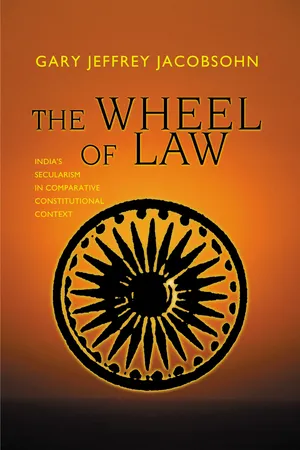
The Wheel of Law
India's Secularism in Comparative Constitutional Context
- 344 pages
- English
- ePUB (mobile friendly)
- Available on iOS & Android
About This Book
How can religious liberty be guaranteed in societies where religion pervades everyday life? In The Wheel of Law, Gary Jacobsohn addresses this dilemma by examining the constitutional development of secularism in India within an unprecedented cross-national framework that includes Israel and the United States. He argues that a country's particular constitutional theory and practice must be understood within its social and political context. The experience of India, where religious life is in profound tension with secular democratic commitment, offers a valuable perspective not only on questions of jurisprudence and political theory arising in countries where religion permeates the fabric of society, but also on the broader task of ensuring religious liberty in constitutional polities.
India's social structure is so entwined with religion, Jacobsohn emphasizes, that meaningful social reform presupposes state intervention in the spiritual domain. Hence India's "ameliorative" model of secular constitutionalism, designed to ameliorate the disabling effects of the caste system and other religiously based practices. Jacobsohn contrasts this with the "visionary" secularism of Israel, where the state identifies itself with a particular religion, and with America's "assimilative" secularism.
Constitutional globalization is as much a reality as economic globalization, Jacobsohn concludes, and within this phenomenon the place of religion in liberal democracy is among the most vexing challenges confronting us today. A richly textured account of the Indian experience with secularism, developed in a broad comparative framework, this book is for all those seeking ways to respond to this challenge.
Frequently asked questions
Information
Table of contents
- Table of Contents
- Preface
- Acknowledgments
- Chapter One Introduction: Ashokas Wheel
- Part One Three Models of Secular Constitutional Design
- Chapter Two Nations and Constitutions: Dimensions of Secular Configuration
- Chapter Three Secularism in Context
- Chapter Four India: The Ameliorative Aspiration
- Part Two Constitutional Perspectives on the Challenge to Secularism in India
- Chapter Five Religion, Politics, and the Failure of Constitutional Machinery
- Chapter Six Corrupt Practices: Religious Speech and Democratic Deliberation
- Chapter Seven Adjudicating Secularism: Political Liberalism or Religious Revivalism?
- Chapter Eight So You Want a (Constitutional) Revolution? Lessons from Abroad
- Chapter Nine Conclusion: Toward Secular Convergence
- Bibliography